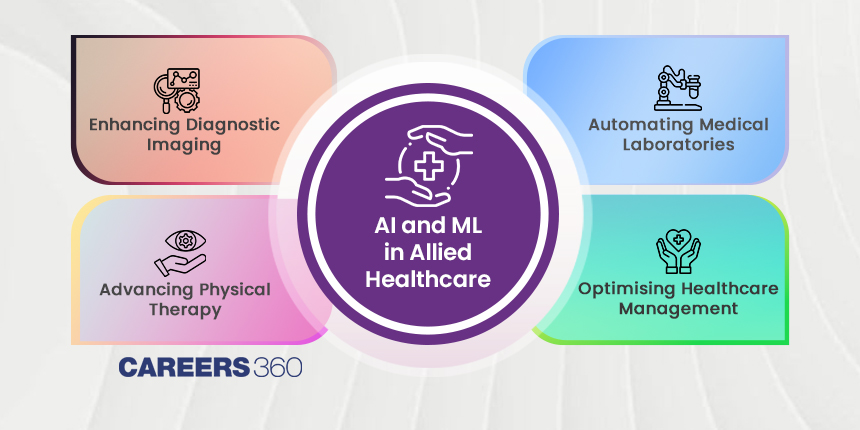AI and Machine Learning in Allied Healthcare: Advancements and Applications
Allied healthcare education is offered at certificate, diploma, undergraduate, and postgraduate levels, preparing students with clinical and technical expertise. With ageing populations, chronic illnesses, and the need for personalised care, allied health professionals are in growing demand. Artificial intelligence (AI) and machine learning (ML) are further transforming this field with smarter solutions.

Allied healthcare supports doctors and nurses through essential diagnostic, therapeutic, and technical services. It includes professionals such as radiographers, physiotherapists, laboratory technicians, occupational and speech therapists. Working in hospitals, clinics, rehabilitation centres, laboratories, and schools, they ensure patients receive complete and continuous care, while AI-driven tools are improving accuracy and efficiency.
Artificial Intelligence and Machine Learning in Allied Healthcare
Artificial intelligence (AI) and machine learning (ML) are becoming important in allied healthcare. These technologies help improve accuracy, save time, and support professionals in delivering better outcomes for patients. From medical imaging to rehabilitation and healthcare management, AI and ML have multiple applications. Below, we have discussed various applications of AI and ML in allied healthcare.
Enhancing Diagnostic Imaging
AI is widely used in medical imaging, supporting radiologists in reading X-rays, MRIs, CT scans, and ultrasounds. Advanced algorithms can detect early signs of cancer, fractures, and other abnormalities that may be missed by the human eye. AI-based imaging tools also reduce reporting time, helping doctors and patients get faster results and start treatment earlier.
Supporting Physical Therapy and Rehabilitation
Machine learning is transforming rehabilitation services. AI-powered devices and wearable sensors monitor patient movements and provide real-time feedback. Some centres are also using virtual reality (VR) and robotics to design personalised therapy programmes. These technologies ensure patients perform exercises correctly, track their progress, and achieve faster recovery.
Automating Medical Laboratories
Laboratory medicine is another area benefiting from AI. Automated systems now conduct routine tests with higher accuracy and efficiency. Machine learning also helps in genomic studies, molecular testing, and disease outbreak prediction. By reducing human error and speeding up processes, AI allows laboratory professionals to focus on advanced and critical investigations.
Optimising Healthcare Management
AI is also used in healthcare administration. Predictive analytics helps hospitals manage patient flow, staffing, and resources more effectively. AI-based systems improve electronic health records (EHRs), generate quick reports, and support clinical decision-making. Chatbots and virtual assistants provide patients with 24/7 access to health information, appointment booking, and basic guidance.
Conclusion
AI and ML are no longer future possibilities but an active part of allied healthcare today. From diagnostic imaging and laboratories to rehabilitation and hospital management, these technologies are helping professionals deliver more accurate, timely, and efficient care. As healthcare continues to evolve, allied health professionals trained in both clinical and digital skills will be in high demand, making this field a strong career choice.